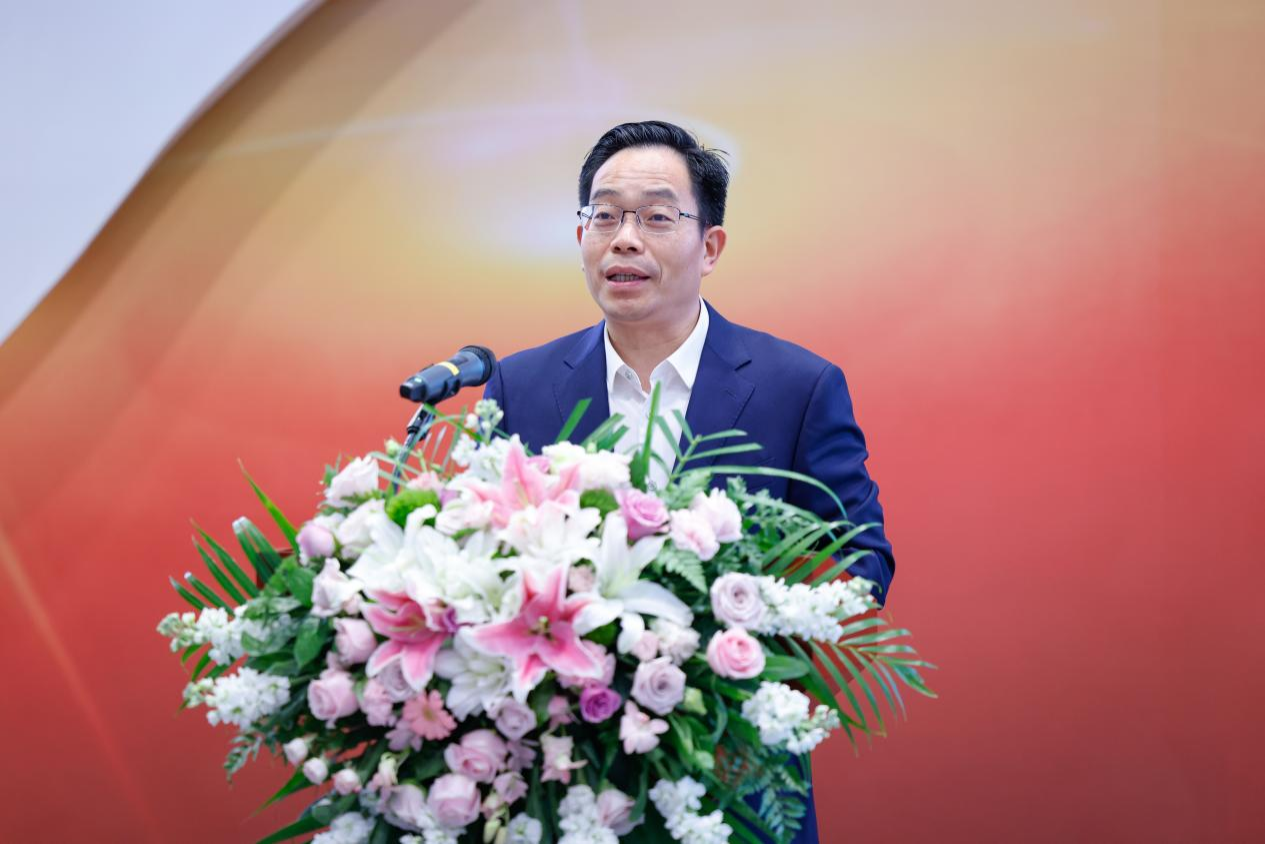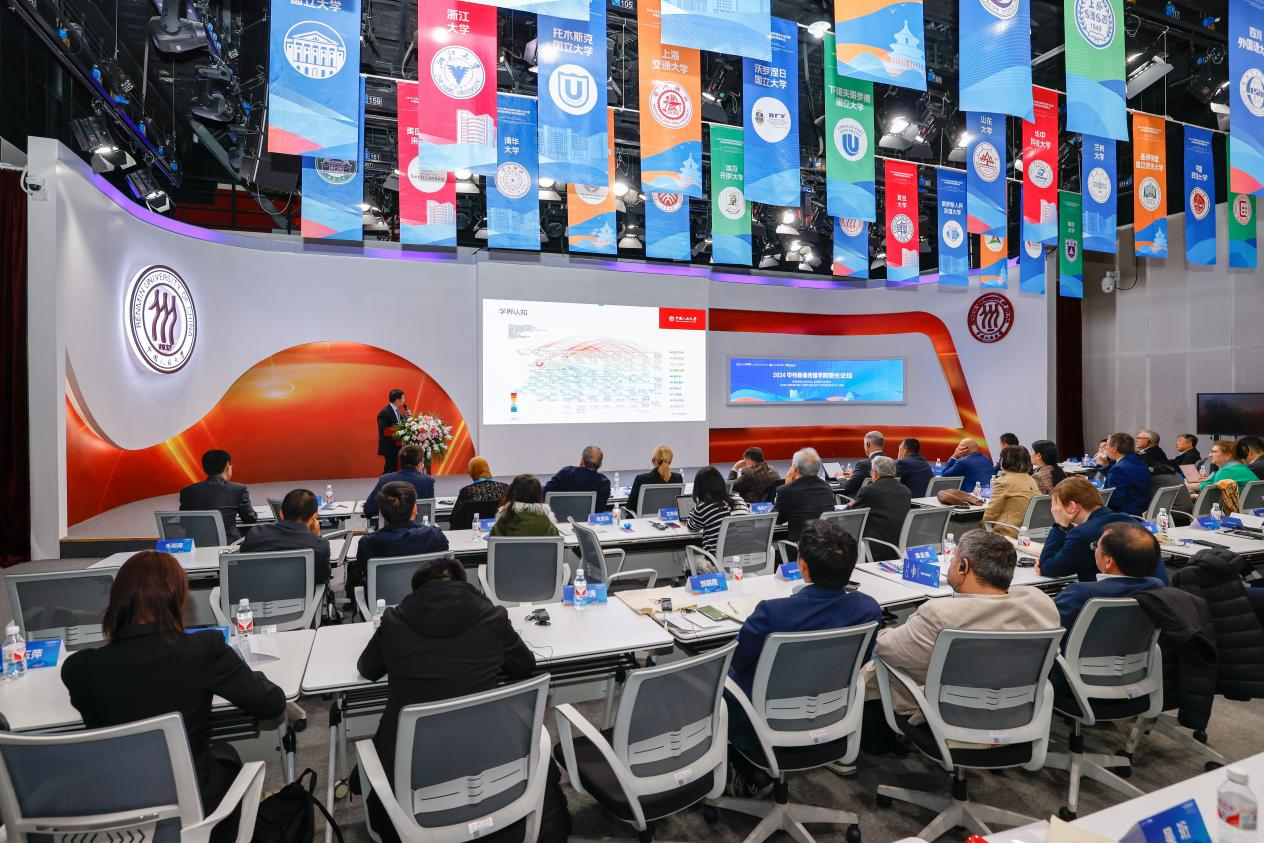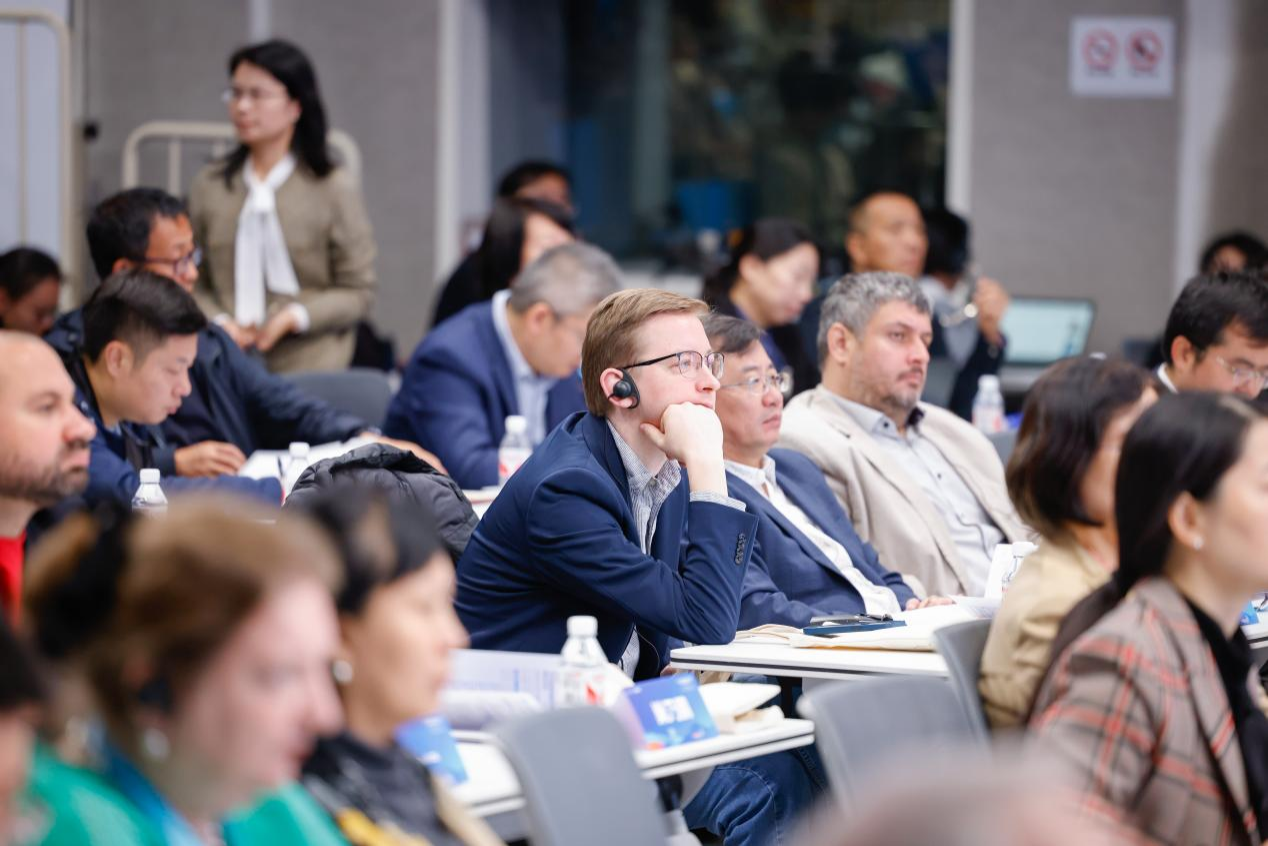International Journalism and Communication Deans’ Conference 2024: Addressing Global
Challenges and Knowledge Innovation
To implement President Xi Jinping's important instructions on constructing China’s independent knowledge system and promote the development of journalism and communication studies, the International Journalism and Communication Deans’ Conference 2024 was held on October 19 at the School of Journalism and Communication, Renmin University of China (RUC). The event was co-organized by the School of Journalism and Communication of RUC, the Alliance for China’s Independent Knowledge System in Journalism and Communication, the Research Center of Journalism and Social Development of RUC, and the Journalism and Communication Professional Committee of China Association of Higher Education.

The forum, themed "Global Challenges and Knowledge Innovation in Journalism and Communication Studies," brought together deans and scholars from journalism and communication schools worldwide for academic exchange and dialogue. It aimed to foster intellectual exchange within the discipline and explore paths for collaboration and development. Forty-eight deans and department heads from both home and abroad attended the forum.
Feng Shizheng, Vice President of Renmin University of China, delivered the opening address. He emphasized that in the current era of digitalization and globalization, journalism and communication face new challenges and opportunities. He expressed hopes that this forum would promote comprehensive discussions on the significant and urgent issues faced in the construction of China’s independent knowledge system in the field of journalism and communication studies. He also hoped it would help establish a solid, diverse network of trust and collaboration, achieve mutual learning, support, and success both among universities and at the international level, and contribute wisdom and strength to the development of the discipline.

The forum was chaired by Zhang Huifeng, Secretary of the Party Committee of the School of Journalism and Communication of RUC. Deans from journalism schools in the United States, Russia, Egypt, and China delivered keynote speeches, focusing on global challenges and knowledge innovation in the field.
Tom Reichert, Dean of the College of Information and Communications at University of South Carolina, highlighted the critical importance of artificial intelligence (AI) skills for the career advancement of journalism and communication graduates. With the widespread application of AI in the workplace, graduates must be equipped with relevant tools and technologies to meet employers' demands. The College of Information and Communications of University of South Carolina has responded by recruiting AI-specialized faculty, offering AI-focused courses, requiring basic AI certifications for students, and providing hands-on tools and activities to enhance students' AI skills. Additionally, the school partners with industry to offer practical experience and supports companies in leveraging AI technologies through training.
Qiang Yuexin, Dean of the School of Journalism and Communication at Wuhan University, delivered a speech titled "China as a Method: The Foundation, Approach, and Context of Knowledge Innovation in Journalism." From a global perspective on journalism, he discussed the three major challenges facing the field: structural, autonomy-related, and environmental. He emphasized that journalism knowledge innovation should be based on practical experience, employ a multidisciplinary approach, and be rooted in the context of reality. It should focus on China's specific circumstances, integrate theory with practice, actively address challenges brought by technological changes, and contribute to the development of global journalism with Chinese wisdom by constructing an independent journalism knowledge system with Chinese characteristics.
Elena Vartanova, Dean of the Faculty of Journalism at Lomonosov Moscow State University, explored the new structure of Russian media and the challenges they face in the context of digitization and globalization. Technological advancements have driven the development of platform-based business models, changing the ways in which content is created, distributed, and promoted. Meanwhile, traditional Russian media such as newspapers, radio, and television have seen a continuous decline in audiences and circulation, while online media usage has increased significantly. Digitalization and globalization have intensified competition between traditional media and emerging digital platforms, further fragmenting media resources and audience attention. Vartanova emphasized that Russian media must adapt to these changes to maintain content quality and ensure the healthy development of the media ecosystem.
Chen Gang, Dean of the School of Journalism and Communication at Peking University, provided a detailed analysis of numerous challenges that journalism and communication disciplines are facing in the digital age. He stressed the importance of critical thinking, action-oriented learning, and enhancing interdisciplinary integration in response to the changes. First, he reviewed the significant role of improving digital infrastructure in driving the development of the discipline. He then analyzed the thirty-year history of digitalization in China, categorizing it into digitalization of communication, digitalization of lifestyle, and digitalization of production methods. He called for full recognition of the irreversibility of change, emphasizing the need to foster a sense of vigilance even in times of stability, and to pursue systematic innovation and the construction of an independent knowledge system.
Souraya El Badaoui, Dean of the Faculty of Mass Communication at Cairo University, discussed the future of journalism education in light of AI. She elaborated on AI’s application, role, and the core skills that journalists should develop in the AI era. In terms of application, AI plays a crucial role in data summarization, source tracing, and personalization. Regarding its role, AI is an enhancement tool, not a replacement for human news production. On the skills front, she emphasized that constructing in-depth narratives, ensuring source reliability, and avoiding the negative impacts of AI are essential human skills. She believed that the future of journalism will not only be shaped by AI but also by those who use AI to tell important stories.
Zhang Mingxin, Dean of the School of Journalism and Information Communication at Huazhong University of Science and Technology, focused on the challenges facing journalism and communication education and proposed solutions. He identified four key challenges, including the pressure from ongoing reforms in journalism education, the lag in professional development, the slow progress of faculty capabilities, and the need for a broader international perspective. To address these issues, he suggested strengthening the construction of an independent knowledge system, responding to societal and technological changes, and prioritizing competency-based education to gradually resolve these challenges.
Viktor V. Barabash, Dean of the Faculty of Philology at Russian University of Friendship of Nations (RUDN University), emphasized the critical role of "big data" in modern journalism education. He noted that contemporary journalism and communication research spans fields such as new media platform applications, market-oriented strategic communication, and cross-cultural exchanges. Key areas include future communication under AI influence and practical journalism studies. Barabash advocated for a big data-driven educational model, guiding students to use algorithms for information processing, analyze media content and audiences through machine learning, and ultimately produce high-quality news narratives.
Zhang Taofu, Dean of the School of Journalism at Fudan University, underscored the heterogeneous knowledge structure of Chinese journalism and communication studies. He argued that Western communication theories, as "knowledge of the Other," cannot be directly transplanted into Chinese context. Chinese scholars should recognize the limitations of Western theories and focus on "de-contextualization" to address both internal and external structural challenges. By leveraging China's unique conditions and responding to contemporary demands, scholars should proactively and wisely integrate the "micro logic" with the "macro logic" to reconstruct an independent Chinsese knowledge system for journalism and communication that interlinks knowledge, values, and norms.
Zhou Yong, Dean of the School of Journalism at Renmin University of China, called for heightened attention to AI's impact on journalism education. Analyzing keyword frequency data from China National Knowledge Infrastructure (CNKI), he revealed shifts in AI research from conceptual discussions to practical applications, as well as trends in AI-generated content (AIGC) and intelligent media development within industries. Zhou stressed the importance of cultivating students' AI literacy, appropriately leveraging AI tools to innovate teaching methods, and promoting industry-oriented applications. He also cautioned against AI's limitations in quality and effectiveness, urging advancements in foundational technologies and data regulation practices to build a "human-centered"and "human-machine collaborative" knowledge system for journalism and communication.

On the occasion of the first anniversary of the establishment of the Alliance for the Independent Knowledge System of Chinese Journalism and Communication Studies, and in order to collectively address global challenges and encourage knowledge innovation and creation, the Alliance has selected two academic works and ten academic papers based on the data feedback from the "Academic Arena" digital innovation platform of the Information Center for Social Sciences at Renmin University of China, as well as the evaluation results from academic experts. These works will be presented at the conference as the latest achievements in the construction of the independent knowledge system of Chinese journalism and communication studies.

Professor Wu Tingjun from the School of Journalism and Information Communication at Huazhong University of Science and Technology has authored The Complete History of the Ta Kung Pao (1902-1949), a work spanning more than 2.7 million words. He argues that studying the history of the Ta Kung Pao is equivalent to grasping the pulse of Chinese journalism. The journalistic ideals, professional spirit, and practical actions manifested in the operation of the Ta Kung Pao continue to profoundly influence our journalism work to this day, and they represent an effective path for constructing the independent knowledge system of Chinese journalism and communication studies.
Professor Yang Baojun from the School of Journalism and Communication of RUC has authored A Study of Journalism Theories in China and Ten Theories of Journalism (Revised Edition), works that have been developed over 24 years. These books provide a foundational framework for observing, analyzing, and exploring journalism theories in China. They offer in-depth and systematic studies of many fundamental concepts, categories, and ideas within journalism theory.
Professor Wang Chenyao from the School of Journalism and Communication at Nanjing University introduced the paper ”The ‘News-Propaganda-Story‘Triadic Model: On the Formal Interface of Cultural Subsystem." From the perspective of system differentiation, she proposed that more precise theories with interpretive and guiding significance for practical work can be developed in the future.
Zhang Huiyu, researcher of the School of Journalism and Communication at Peking University gave a brief presentation on his paper "The Theoretical Source and Journalistic Practice of Production Communication: Take the People's Daily in Shanxi, Hebei, Shandong and Henan Base Area as an Example." He pointed out that the promotion of agricultural and industrial production was not only essential for economic development during the Chinese People’s War of Resistance against Japanese Aggression, but also profoundly reflected the unique achievements of the Communist Party of China in the field of news and communication.
Professor Liu Xiaowei from the School of Journalism and Communication at Nanjing University analyzed the innovations of her paper "Political Information Game and Restudy of the JinZouYuan Newspapers in Tang Dynasty" from four perspectives. Her research remains rooted in the scholarly tradition of Chinese journalism history while shifting from traditional name-based textual verification to a deeper exploration of political communication dynamics.
Professor Cao Ruiqing from the School of Journalism and Communication at Nanjing Normal University conducted an in-depth study based on his paper "A Textual Research on Government Gazette in Qing Dynasty from Jiaqing to Tongzhi Period." His research explores how changes in information communication methods during China's passive globalization process influenced the country's overall transformation in modern times. By tracing the "Chinese experience" in history, he aims to provide insights for the construction of an independent knowledge system.
Sha Yao, Associate Professor of the School of Journalism and Communication at University of Chinese Academy of Social Sciences shared the research findings on how media and communication can address the challenges of rural revitalization based on his paper “Communicable Relationship:Resolving the Internal Tension Among Multiple-Subject Relationships in Rural Revitalization——Based on the Field Research in County A”. He also elaborated on the critical role that “communicable relationship” play in alleviating internal tensions within rural communities and in shaping supportive subject for future rural revitalization efforts.
Mao Lili, a PhD candidate from the School of International Journalism and Communication at Beijing Foreign Studies University and Vice Director of Guangdong center for economic research of Xinhua News Agency, introduced her paper “The Hypothesis of the Nine Interlocking Rings Theory of International Communication.” Building on the paradigm in which humans serve as the primary subjects of communication in information exchange and cross-cultural interaction, she expanded upon the “Six Interlocking Rings” model to propose the “Nine Interlocking Rings” concept. This new concept aims to guide the reproduction and dissolution of cultural boundaries, thereby enhancing the quality and effectiveness of international communication.
Li Jing, a faculty member of the School of Journalism and Communication at Zhengzhou University, introduced “The Evolution and Logic of the Communist Party of China's International Communication Policy in the Past Century”, which adopts journalism and communication studies as the primary perspective and also incorporates perspectives from political science and Marxist theory. The paper traces how, over the past century, the Communist Party of China has continually tested and adjusted its external communication policies in practice, demonstrating its ever-deepening understanding of journalism work and the principles of external communication.

In the afternoon, parallel forums of the Deans' Conference were held simultaneously, where experts and scholars exchanged views on innovative pathways for advancing the international communication discipline and on cultivating international communication talents in the new era.
International Journalism and Communication Deans’ Conference is a brand of the School of Journalism and Communication of RUC and is now in its ninth edition. It aims to provide a platform for intellectual exchange among deans, scholars, teachers, and students from journalism and communication schools worldwide, thereby building bridges to promote disciplinary development and international exchanges. Over the years, the conference has invited deans and heads of journalism faculties at home and abroad to engage in in-depth discussions on major issues confronting the global journalism education community, promote the exchange of ideas within the discipline, share experiences, and jointly explore pathways for cooperation and development. The convening of this conference vividly embodies the important instruction of President Xi Jinping, that "accelerate the construction of philosophy and social sciences with Chinese characteristics—in essence, is to establish an independent Chinese knowledge system.” This event has contributed a solid cultural force to the realization of Chinese path to modernization and holds significant importance for the flourishing development of journalism in our country.
翻译:陶语嫣 唐麟翔 刘志凌 刘博宁 高云倩
编辑:于怡然 纪静楠 林可 黎原



